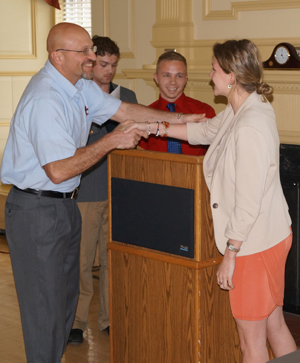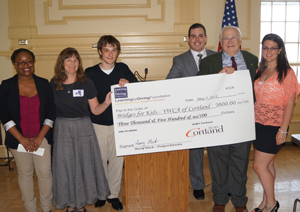Bulletin News

05/14/2013
A semester’s worth of work recently benefited four Cortland area nonprofit agencies in a big way, when a course at SUNY Cortland that is devoted the practical side of philanthropy awarded each a grant of at least $2,000.
Sixteen local charities and agencies had submitted applications for a share of $10,000 in Learning by Giving Foundation grant funding. The lucky organizations were formally announced May 7 during a ceremony in Brockway Hall Jacobus Lounge.
During the Learning by Giving Foundation Grant Awards Celebration, the 16 students who took Philanthropy and Civic Engagement: Teaching Students How to Give met representatives from the organizations that will benefit from their hours of analysis, discussion and decision-making.
Erik J. Bitterbaum, SUNY Cortland’s president, introduced and welcomed the Learning by Giving Grant recipients, accompanied by Richard Kendrick, director of the Institute for Civic Engagement (ICE), and Henry Steck, SUNY Distinguished Service Professor.
The awardees, the grants, and the projects each grant will support, are as follows:
• Catholic Charities of Cortland County received an award of $2,000 for its summer lunch program.
• The Cortland County Mental Health Association won a $2,000 grant to partner with the Cortland City Police Department to train a response team for emotionally disturbed people.
• Lime Hollow Center for Environment and Culture was awarded $2,500 to acquire environmental educational material for the discovery lab and classroom in the nature center’s new building.
• The YWCA of Cortland earned $3,500 for the Bridges for Kids program, specifically its “Salamanders, Summer and Support — Oh My!” project.
For the second year in a row, SUNY Cortland joined a 32-member group of colleges and universities to earn the $10,000 in funds from the Learning by Giving Foundation, which aims to promote the study of philanthropy at the undergraduate level. The select class also includes institutions such as the University of California at Berkeley, Columbia University and Stanford University.
“In other classes, we talk about what we would do or what we might do,” said Louisa Frick, an international studies major from Red Hook, N.Y. “In this class, we actually get to do something — something that’s really important.”
The course, which is backed by the competitive funding for the second year in a row, also receives support from the College’s Political Science Department and ICE. None of the money from the Learning by Giving Foundation could be used on course-related expenses; all of it will split among the four community agencies.
“I personally feel really proud for the College and for (the State University of New York),” said Steck, a professor of political science who taught the course. “I’m proud for our students, too, because this demonstrates that we’re on the cutting edge of doing things.”
 |
| Sara Earl, second from left, accepts a check for the YWCA's Bridges for Kids program. |
The 16 students, coming from nine different majors that included business economics, professional writing, and exercise science, learned quickly that awarding grants would not prove as easy as handing out someone else’s money.
“I was expecting it to be hard, but I didn’t realize it was going to be so hard choosing between different organizations,” said Lizaury Rodriguez-Marin, a political science major from Freeport, N.Y., noting that many of the not-for-profit agencies showed similar needs.
Guest lecturers in the class spoke to the importance of prioritizing specific needs. Among the many transferable skills students learned, they were trained in real-world ways to debate effectively, work collaboratively and write efficiently to a request for proposal.
“We also learned how stressful it is for the organizations on the other side just to get money for their programs,” said Katherine Wick, a sociology major from Lockport, N.Y. “They’re constantly looking for money, constantly applying for grants.”
Matthew D’Alesio, a political science major from Yorktown Heights, N.Y., who aspires to a career in politics, said that the course introduced him to the community’s specific needs and that he’s more likely to give to not-for-profit organizations in the future.
“The proposals we saw all showed a lot of need,” he said. “They definitely made me want to spread the wealth through philanthropy.”

